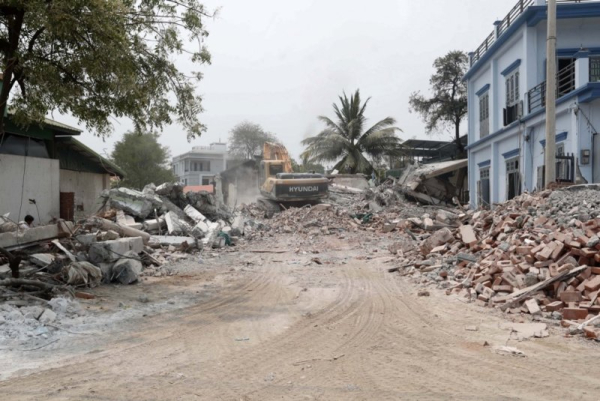

1 of 2 | A man in an excavator on Friday clears the debris of structures damaged by a 7.7-magnitude earthquake last week in Tada-U, Mandalay, Myanmar. Photo by Nyein Chan Maing/EPA-EFE
The death toll from a 7.7-magnitude earthquake one week ago that struck Myanmar rose to 3,354 people as millions have been made homeless and are in need of medical care.
Another 4,850 people were injured and 220 remain missing in Myanmar after the earthquake, in addition to at least 23 deaths in Thailand, Myanmar’s state media organization MRTV reported, according to ABC News. The quake also rocked China. Advertisement
The 23 deaths in Thailand all occurred in the capital city, Bangkok, the Bangkok Metropolitan Administration said, noting that 15 of the deaths happened when a high-rise building under construction collapsed. Dozens of other works are still missing, city officials also said.
Search-and-rescue operations have continued in Myanmar and Thailand since the earthquake hit March 28. China, India and Russia have sent rescue crews and disaster-response teams to help Myanmar and, despite the dismantling of the U.S. humanitarian agency USAID, the U.S. has added $7 million in aid to an earlier pledge of $2 million. Advertisement
On Friday, Prime Minister Min Aung Hlaine inspected the relief and rehabilitation in the earthquake-affected areas after returning from a regional summit in Bangkok.
The United Nations estimates more than 17 million people may have been affected by the trembler, including nearly nine million “experiencing the highest level of devastation.” There are 54 million in Myanmar.
U.N. Secretary-General António Guterres said Thursday in New York that the earthquake has “supercharged the suffering” with the monsoon season coming up and four years after a civil war.
“Myanmar today is the scene of utter devastation and desperation,” he said.
Tom Fletcher, the U.N. under-secretary for Humanitarian Affairs and Emergency Relief coordinator, met with victims in the central Myanmar city of Mandalay, which was near the earthquake’s epicenter.
“The destruction is staggering,” he wrote on X. “Lives lost. Homes destroyed. Livelihoods shattered. But the resilience is incredible. The UN is here to help — the world must rally behind the people of Myanmar.”
Armed forces have ruled Myanmar since a 2021 coup of the civilian government of Aung San Suu Kyi. As of September 2024, the United Nations reported that at least 5,350 civilians had been killed and more than 3.3 million displaced by the civil war. Advertisement
More than half the population lives below the poverty line, according to the the UN, which has previously said the health system there is overwhelmed and low medical supplies.
More than 86% of healthcare facilities, including many hospitals, were damaged by the earthquake, according to the UN, as the World Health Organization reports that more than 5,000 people in the country are in urgent need of trauma care.
WHO’s deputy representative in Myanmar, Vibhu Mishra, told U.N. News in an interview Myanmar is “an emergency within an emergency.”
“Over the past week, we have been working around the clock, alongside other U.N. agencies, emergency medical teams from abroad and our respective headquarters and regional offices to mobilize the response,” Mishra said.
“Unfortunately, we have witnessed the collapse of several hospitals. This was already a health system that was overstretched and severely impacted by four years of crisis. The earthquake has only exacerbated the humanitarian and healthcare needs.”
A state of emergency was declared over an urgent need for blood and officials have said there is a looming threat of disease outbreaks, including cholera.
The nation also is enduring heat of 102 Fahrenheit with electricity limited because of damage to infrastructure. Many people remain without shelter, forced to sleep outdoors because their homes were destroyed or concerned about further collapses, according to Misdhra. Advertisement
“They are working under very difficult situations despite their own personal losses,” Misdhra said. “The earthquake has only exacerbated the humanitarian and healthcare needs.